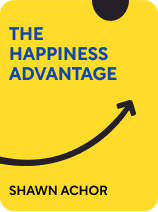

This article is an excerpt from the Shortform book guide to "The Happiness Advantage" by Shawn Achor. Shortform has the world's best summaries and analyses of books you should be reading.
Like this article? Sign up for a free trial here .
Do you want to know how to become happier? What science-backed tips can help you become happier?
In The Happiness Advantage, author Shawn Achor offers his tips for how to become happier, based on research in positive psychology and neuroscience. He shows how happiness can dramatically improve your health, personal relationships, and career.
Here are some great tips for how to become happier.
How to Become Happier Today
If you want to know how to become happier, the advice below can help.
Your happiness fluctuates all the time, but everyone has a distinct baseline of happiness. In order to reap more benefits of the Happiness Advantage, you can actually take steps to permanently raise your happiness baseline. Consider incorporating some of these happiness-building activities into your day-to-day routine to find out how to become happier.
- Meditating: Five minutes of meditation a day can make you more calm and aware. In the long term, it could permanently rewire your brain for greater happiness, boost your immune system, and lower your stress.
- Building up positive anticipation: Getting excited about an upcoming event activates your brain’s pleasure centers as much as having the actual experience. Think about experiences you’re looking forward to, and make plans that you can get excited about.
- Giving back: Research shows that people who perform acts of kindness are much happier than people who don’t. One day each week, try to perform five acts of kindness. These acts can be small and simple, but they should be planned proactively (rather than simply patting yourself on the back for something you have already done).
- Cultivating a positive environment: Your surroundings impact your mindset, so fill yours with things that make you happy, such as pictures of loved ones. Spending 20 minutes outside in good weather can also put you in a happier mood, as will eliminating negative stimuli, such as violent television.
- Exercising: The positive effects of exercise are powerful—not only does it release feel-good endorphins in your brain, but it also increases your motivation, reduces your stress and anxiety, and promotes focus. Incorporate regular exercise into your routine.
- Investing in experiences: Spending money on activities (such as musical events and group dinners) or on other people—sometimes referred to as “prosocial spending”—creates more meaningful and enduring happiness than spending money on yourself.
- Tapping into your talents: Using a skill that you excel at or making the most of an ingrained character trait (such as a love of learning) can lower depression and increase happiness.
Use the Tetris Effect
The more you engage in any pattern of thinking, the more your brain will use the same formula to evaluate other things in life. In gaming, this phenomenon has been dubbed the Tetris Effect: After playing hours of the tile-matching video game, gamers saw objects in their everyday lives as shapes that they needed to fit into gaps, as if they were still playing the game.
In the same way that playing hours of Tetris can rewire your brain, other mental exercises can reprogram your brain to notice positive scenarios and opportunities. In order to train your brain to see the positive, try one of these strategies:
- Every day, take five minutes to write a list of three things in your life that make you happy or grateful.
- Three times a week, spend 20 minutes writing about a positive experience.
Make the habit easier to maintain in order to increase your chances of success:
- Do your writing at the same time each day.
- Keep the necessary tools—your pen and paper—easily accessible.
Involve others by turning these exercises into a group activity. For example, make a ritual of going around the dinner table each night and having everyone list three positive things from their day, or do the same at weekly staff meetings. When you create social support, the accountability helps you to maintain the habit, and the benefits of positive thinking multiply among everyone involved.
The goal of the Positive Tetris Effect is not to have irrational optimism or turn a blind eye to problems that need improvement. Rather, by adding a positive tint to your view of the world, you can maintain awareness of problems and concerns, while choosing to prioritize a positive perspective. In other words, recognizing and having gratitude for the good in your life is actually the best mechanism for creating more positive outcomes.
Questions to Ask Yourself: How to Become Happier
Developing a positive thought pattern takes practice. Here is an exercise to help you with how to become happier:
- List three things that you’re grateful for today.
- If you were to make a daily habit of writing this gratitude list, how would you incorporate it into your routine?
- How could you involve other people in this ritual, either at home or at work (for example, by having each person recite their list at the dinner table or the meeting room)?
- Think about your schedule for the day and week ahead. Identify one opportunity you hadn’t previously recognized. (For example, attending a work conference may be an opportunity to get to know a new coworker better.)
- Which happiness-building activities from the chapter (such as meditation, exercising, and giving back) will you try today?
- How will you incorporate these activities into your daily routine?
- On a scale of 1 to 10, how would you rate the happiness of your team at work? What do you do presently to contribute to a happy workplace?
- Name three ways you can regularly give more positive feedback at work.

———End of Preview———
Like what you just read? Read the rest of the world's best book summary and analysis of Shawn Achor's "The Happiness Advantage" at Shortform .
Here's what you'll find in our full The Happiness Advantage summary :
- How happiness isn’t the result of success, it’s the cause of it
- The benefits of happiness—from increased creativity to improved health
- Strategies for adopting a positive mindset and raising your happiness baseline






